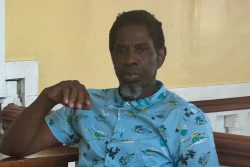 The demonization of religious and spiritual practices has a long history. Slavery, colonization, and man’s incapability or refusal to embrace and appreciate the practices of other cultures, contribute to this. Though society appears to be largely tolerant, the fact that some religious and spiritual practices are perceived as evil or misguided by sections of society is still a reality.
The demonization of religious and spiritual practices has a long history. Slavery, colonization, and man’s incapability or refusal to embrace and appreciate the practices of other cultures, contribute to this. Though society appears to be largely tolerant, the fact that some religious and spiritual practices are perceived as evil or misguided by sections of society is still a reality.
There are various theories about the origin of mankind and the many factors that contributed to how we evolved and developed various spiritual and religious practices. We see similarities at the root of these developments. It is mankind’s way of understanding our origin, our purpose and what happens after death.
It is, therefore, imperative that we respect the various theories and practices that have evolved as a way of understanding life. Knowing that what may be perceived as truth is subject to evolve should encourage us to respect the various interpretations that exist. We are certain of birth and death. Most believe in a higher power that is responsible for creation, which they seek to worship either through religion and/or spiritual practices.
In Guyana, Islam, Hinduism and Christianity are the dominant religious faiths. There are also a minority of the Rastafarian, Bahai and Hebrew faiths. People are not made martyrs here because of their religious beliefs, places of worship are not destroyed and protests against religious rights and freedoms are not prevalent. These facts indicate that we are principally tolerant. However, there is evidence that underlying tensions and religious intolerance also exist here. There are people who may embrace one religion’s way of life but demonize another. Here we hear about the superiority of one religion as compared to another. Here we see the assumption by one group that their Gods and prophets are righteous and true while those of another are false.
I was inspired to write this piece because of a recent incident where African spiritual practices were again demonized. This is a norm in our society. A couple of months ago there was an incident where Guyanese who practice African spirituality were who engaged in a religious ceremony in the Botanical Gardens and were mocked and criticized because it was thought they were invoking spirits and therefore engaging in practices which many deem ungodly. There was another incident within the last two weeks where a picture circulated on social media of a group of people dressed in garb that would indicate they engage in African spiritual practices who were also ridiculed and accused of being on a path deemed unrighteous.
The continuous demonization of African spiritual practices is as a result of Western influences. Sadly, Western culture has managed to influence and obstruct almost every section of this planet’s culture. And even many of the descendants of these cultures have joined in condemning their spiritual practices.
Places like Haiti that gained their emancipation by in part using the spiritual practices they brought from Africa should be celebrated. Those who sought to demonize these practices would have witnessed how powerful they are. They would have also recognized that people who understand the power of these practices will walk in a different light in this world and be powerful beyond measure.
In his book, ‘African Origins of the Major Western Religions,’ Yosef ben-Jochannan wrote “Paganism, Voodooism, Witchcraft, Fetishism, Black Magic, Obyah and Oledamare are all but a mere sample of the many names relegated to a few of the righteously sacred religions of solely traditional indigenous African origin – according to most European and European-American educators, theologians and general missionaries who believe within themselves that they have been ordained by some God or other to save mankind from “themselves.”
There is a misconception in Guyana that all those who choose to engage in traditional African spirituality are engaging in sinister activities, which many choose to label as obeah. There are a few theories about the origin of obeah. It is said to have originated in West Africa as a religion of healing and connecting and communicating with ancestral spirits.
In all religions, there are aspects of good and evil. The followers of any religion can choose to use their knowledge and beliefs for good or evil. They who choose to engage in evil practices will face their karma. Using one’s spirituality for justice, as was the case in Haiti, is freedom.
I think most Guyanese who criticize or condemn African spiritual practices have never taken the time to investigate.
In her book Guyanese Komfa: The Ritual Art of Trance, Guyanese scholar, writer and publisher Dr. Michelle Yaa Asante, who resides in England, listed spiritual systems that evolved in the Caribbean as a result of slavery. These include Guyanese Komfa, Cuban Santeria, Haitian Vodou, Orisha Religion of Trinidad, Myal, Revial or Kumina of Jamaica, and Winti and Ndyuka of Suriname.
Books such as Asante’s will provide further insight into the aforementioned for those who may be interested in investigating.
But for many Guyanese, the indoctrination about African spiritual practices being immoral often begins in childhood. This not only affects those in the diaspora but also on the African continent. In an age of enlightenment, there is no excuse for such ignorance.
When we understand the basic tenets of religion and spirituality, we would learn to respect other forms of worship even when we do not believe in them. Unfortunately, in Guyana it is not only the African spiritual practices that suffer demonization. We witness this attitude also with Hindu spiritual practices. Jhandi flags, for example, are looked at as symbols of evil by some. There is also the representations of the Gods. Gatherings at the ocean perturb many people in this society. The laying of wreaths and offerings in honour of ancestors concern them. Whether we label all Rastafarians as insane or Muslims as terrorists, it is intolerance which contributes to the decline rather progression of our society
In the Egyptian Book of the Dead and the Book of Coming Forth by Day by Muata Ashby, it is written that “Religion has three levels of practice. The first is myth, which includes traditions, stories and everything related to it. The next stage is ritualization of the myth. The final stage is the metaphysical philosophy behind the teachings given to the myth.”
In the ‘Handbook of Religious Yoruba Concepts,’ Baba Ifa Karade writes, “The aim of man’s mystical search is to acquire an imperishable consciousness through a progressive communion of his physical body (his temporal reality), with his spiritual being (his immortal reality), and his ‘kinship’ with his divine cause.”
There are truths in every religion as well as untruths. Whatever spiritual path we choose should lead to empowerment. It is therefore imperative that the same respect that is given to the Gods of prophets of the major religions should also be given to ones that may not be as popular. Instead of demonizing those who chose to observe African spirituality or any other way of life that is not as popular in our culture, the onus is on those who do not understand or have been conditioned to criticize to research. And if you are unwilling to do this, the least you can do is respect.








